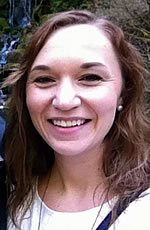Research Fellow Identifies Factors to Improve Child Development
 |
| Photo: Lyndsey Moran |
Lyndsey Moran, a fifth year student in Child Clinical, recently received a research award from The National Institute of Mental Health (NIMH) for her project "Development of Effortful Control as Moderator of the Transactional Growth Between Negative Reactivity and Symptoms in Preschool." Her primary advisor is Liliana Lengua. A brief introduction to the National Research Service Award (NRSA) is provided in a previous article.
Let's start with the basics, where are you from and where did you complete undergrad/masters?
I grew up in New Jersey just outside Manhattan. I did my undergrad at Dartmouth College in New Hampshire where I majored in Psychology and minored in Neuroscience.
How did you wind up at UW/why did you apply here? What do you think about living in Seattle?
After undergrad, I took two years off to work in research and explore my interests. I worked in a neuroimaging lab examining child temperament and psychopathology and became fascinated with the topic. I wanted to continue in this field with my graduate training and Liliana Lengua’s lab was a great fit. It also didn’t hurt that UW’s Child Clinical program ranked top in the nation! I have to admit I’m an east coaster at heart and didn’t love the Seattle weather at first (and still don’t understand why people wait at the cross walk when there aren’t any cars coming), but I’ve grown to love the city and especially the easy access to amazing outdoor activities.
What is your research interest and how did you get into it (what inspires/motivates you)?
My research interests involve identifying factors, both social and cognitive/emotional, that affect a child’s risk for future development of psychopathologies. Specifically, I am interested in understanding how different aspects of temperament develop and interact to shape children’s adjustment. I first got interested in the topic working under Jerry Kagan in Boston who has done extensive and foundational work on temperament. His passion and commitment to the field was very inspiring to me and first got me thinking about developmental trajectories and understanding factors that modulate a child’s risk and may help us develop more effective prevention efforts.
How did you learn about your funding opportunity and tell us about the application/waiting process?
A number of more senior graduate students in my lab had applied for the NRSA in the past, so I greatly benefited from their knowledge about the application process. The application process itself was challenging, to say the least. The application has strict maximum page limits and yet also requires comprehensive information about your proposal, which forces you to be very pointed and direct in your language and really requires you to have a thorough understanding of your topic and your training goals. As tough as completing the initial application was, responding to reviews, making necessary adjustment, and flipping the proposal by the next deadline was even more stressful, but definitely worth the effort.
How did you feel when you learned that your application was accepted and that you will receive 2/3yrs of funding?
I honestly didn’t really believe it at first. The whole process is so long and the communication from the funding agency so vague that I was only cautiously optimistic! My first submission of the application was in December, 2011 and the funding didn’t actually start until July, 2013. Once I finally got official word that my training was being funded, I felt relieved, proud, and very excited.
Do you have any advice/tips/suggestions for others who may apply to this opportunity? About graduate study in general?
The most helpful thing for me was having example applications from other students who had also applied. The application is fairly complicated and having guides to reference made it a lot easier. Also it helped to have a variety of people look over the application. My lab mates and advisor were very helpful in reviewing my work. My advice for graduate school in general is to find balance between focusing on your responsibilities/requirements and having a life/fun. Don’t ask me how you actually find that balance though - that's still a mystery to me.
What do you hope to accomplish with the funding and/or while in the UW Psychology graduate program?
The NRSA funding frees up some of my time that would otherwise have to be invested in either an RA or TA, which will allow me to focus more on my research projects and has given me time to take further classes that are within my interests but outside the required coursework. The funding will also give me more opportunities to attend professional conferences and trainings, which I plan to take advantage of.
What do you like doing in your spare time?
What spare time? Just kidding! I love skiing and generally being outside (hiking, swimming, kayaking, all that good stuff), but I generally find that any free weekend I have I leave town to travel and squeeze in as many adventures as I can before I have to get a real job.
The last book and/or movie you saw and enjoyed?
I’ve been reading Viktor Frankl’s “Man’s Search for Meaning” and keep catching myself writing notes all over the pages, so it must be good!
What you plan to do once you complete your PhD?
I’m hoping to get a job! A more serious answer is that I’d love to find myself in a place that would allow me to balance clinical and research careers, likely starting with a post-doc and hopefully finding a longer-term academic career.
Supplemental Reading:
- Ruth L. Kirschstein National Research Service Award Institutional Research Training Grants
- Grants and Funding Information Service (GFIS) through the UW Libraries.

